Cost of living: The women doing sex work to make ends meet
- Published
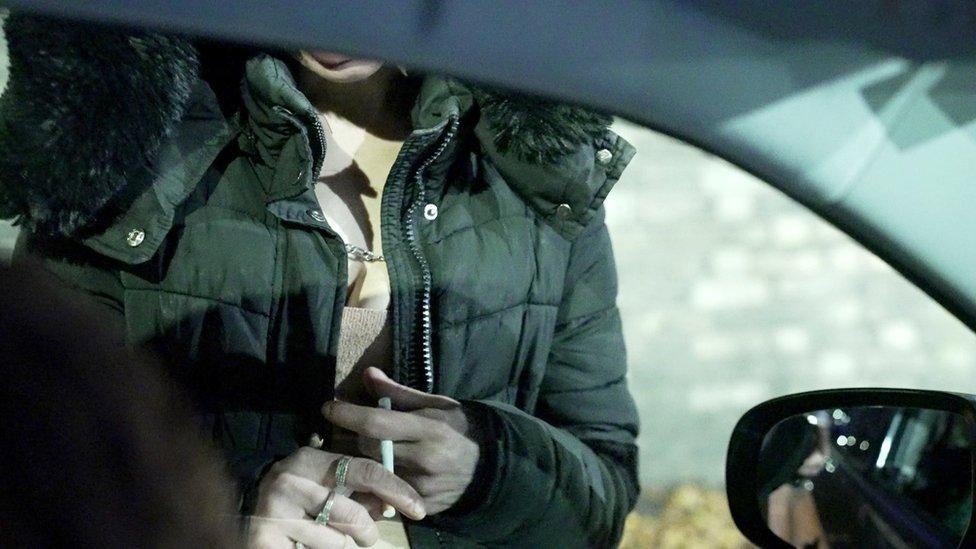
The BBC spoke to some some sex workers in London
Violence has always stalked the streets where sex is bought and sold and sometimes just taken.
Women employed in the "world's oldest profession" face a very real danger. Jack the Ripper may have been consigned to history and folklore, but many other predatory men have stepped into his shadows.
And the women working on the streets of London today have said their predicament is getting worse.
The risk associated with street working is no secret. Research indicates UK sex workers have the highest murder rate compared to women in other occupations., external
So why, according to a number of charities, are more women taking up street prostitution?
It is easy to assume the reasons are those that do not touch many of us. Addiction to drugs is a factor, as is trafficking. Sometimes bad luck is compounded by bad choices. But the reality is more frightening than that.
The English Collective of Prostitutes (ECP), which supports sex workers, said the calls to their helpline were increasingly from women going into or returning to sex work because of the rising cost of living.
Women who need to pay the bills, to keep the gas on, to feed their family and still be able to scrape together the rent.
It is called "survival sex".
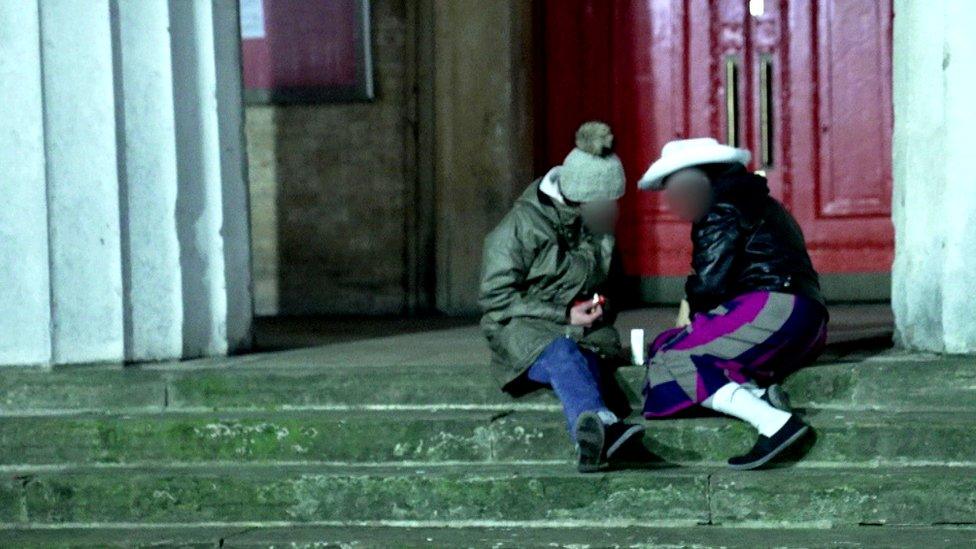
Some women said they were approached for sex when they were doing nothing to suggest they sold it
A report published in 2019 by the Work and Pensions Committee, external examined the links between Universal Credit (UC) and survival sex. A welfare rights adviser for a London-based housing association told the committee about two residents with children who had disclosed involvement in such sexual activity.
One of the women, Ms J, had faced long waits for her UC payments, and they had not been enough to cover basics, including bills and food. She had resorted to shoplifting food and been caught.
"The manager said if I gave him [oral sex] he'd let me off. What could I do? It was that or have the police called. I just did it. I just kept thinking, 'please don't call the police'.
"Anyway, he said afterwards that if I did the same next week he'd let me have 40 quid's worth of stock. It seemed like a fortune.... So, I left the baby with next door and went down to the shop […] It's been like that for months now."
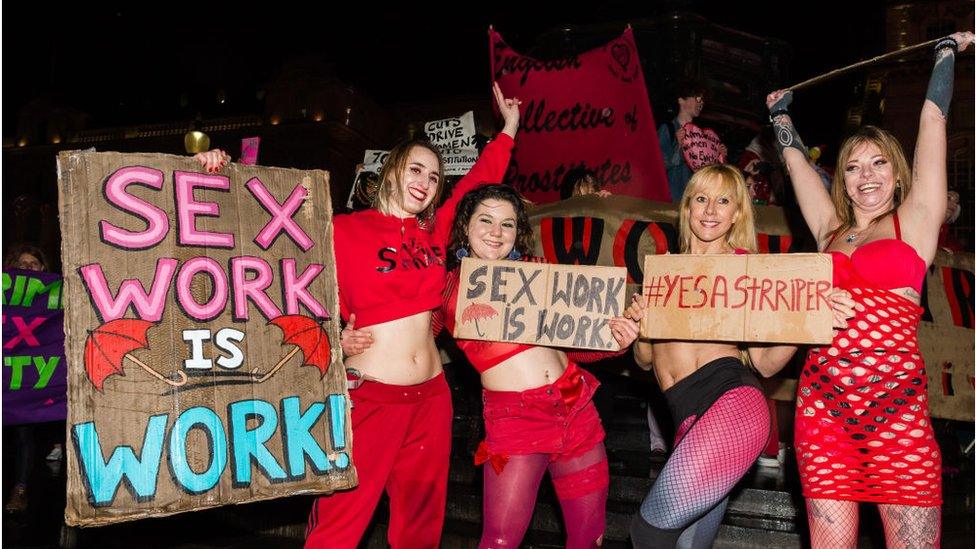
A demonstration against the discrimination of sex workers held on International Women's Day in March 2019
Niki Adams, a spokesperson for the ECP, said about two-thirds of their callers were mothers. She puts a spike in numbers at the end of August down to concerns about affording children's school uniforms before the autumn term began.
"Women are contacting us for information about starting sex work because they can't afford energy, food, or travel," Ms Adams said. "Others are going back into sex work after decades doing other jobs because rising costs mean they can no longer make ends meet."
And there is something of a vicious circle - the more in need women are for money, the greater risks they take. A client who seems "off" may have been avoided in the past - but who can turn down cash that would keep the family afloat?
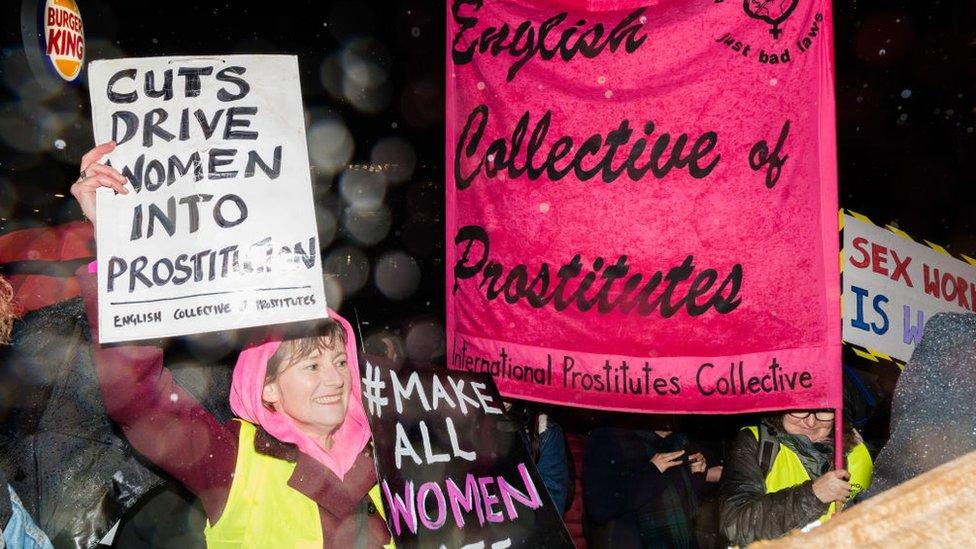
The English Collective of Prostitutes has said many women are turning to sex work because they cannot afford not to
The charity Beyond the Streets is trying to tackle violence against women by harking back to the Whitechapel murders and the issues women faced 150 years ago.
Funded by the Door of Hope project, which offers routes out of sexual exploitation for women in the same area of east London today, tours are being organised by the charity that concentrate on Mary Ann Nichols, Annie Chapman, Elizabeth Stride, Catherine Eddowes and Mary Jane Kelly rather than Jack the Ripper.
"In a sense, things have changed. In theory there's better support and working conditions. But actually the reason so many women still turn to selling sex is exactly the same. It's about drugs, homelessness and poverty," said outreach volunteer Brigid.
"We want these tours to show how resilient and strong the women working on the streets were, and alongside the historic stories, we tell the stories of women still affected by sexual exploitation in the area today, and how people can take action on these issues."
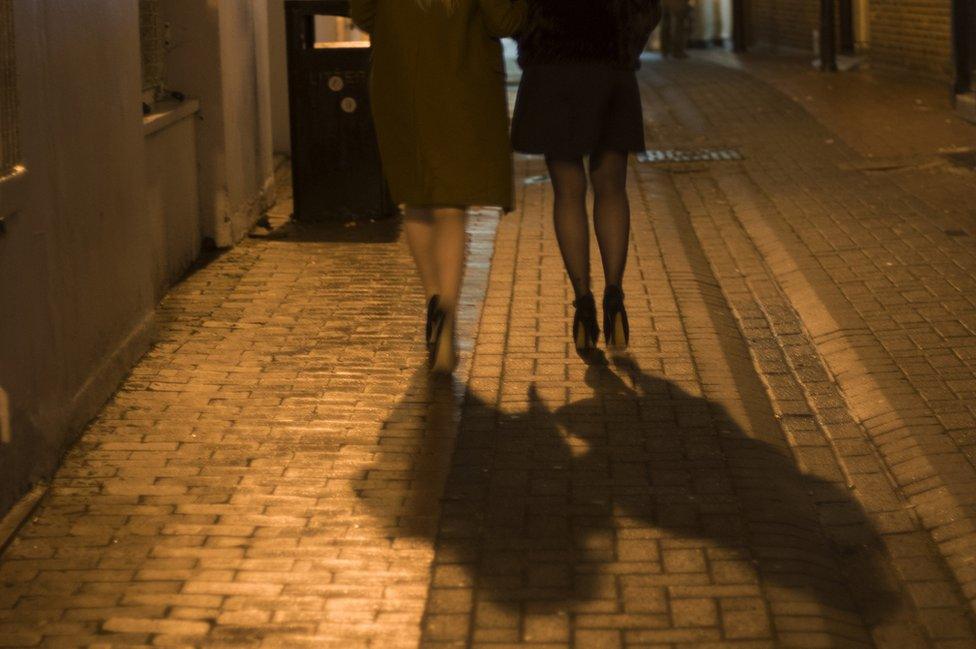
While the vast majority of sex work nowadays takes place in private properties, there are still some women who do street sex work
One woman who has been working on the streets since she was 14 told the BBC she could not remember how many times she had been attacked.
"I don't always feel scared because the drugs hide my fear," she said.
"If I don't really care I put myself in some very dangerous situations."
She also believes there are fewer police officers willing to help, an impression echoed by the workers who say they miss the Vice Squad.
"I used to feel safe when they were there, but not now."
The Met Police no longer has a vice unit operating locally and has shifted towards a "vulnerability model" looking at human trafficking and exploitation which is now led by Central Specialist Crime.
A statement from the force said it was aware that verbal, physical and sexual assaults on sex workers "are significantly under-reported".
It added that anyone reporting a crime, would be treated "respectfully, with dignity and without judgement".
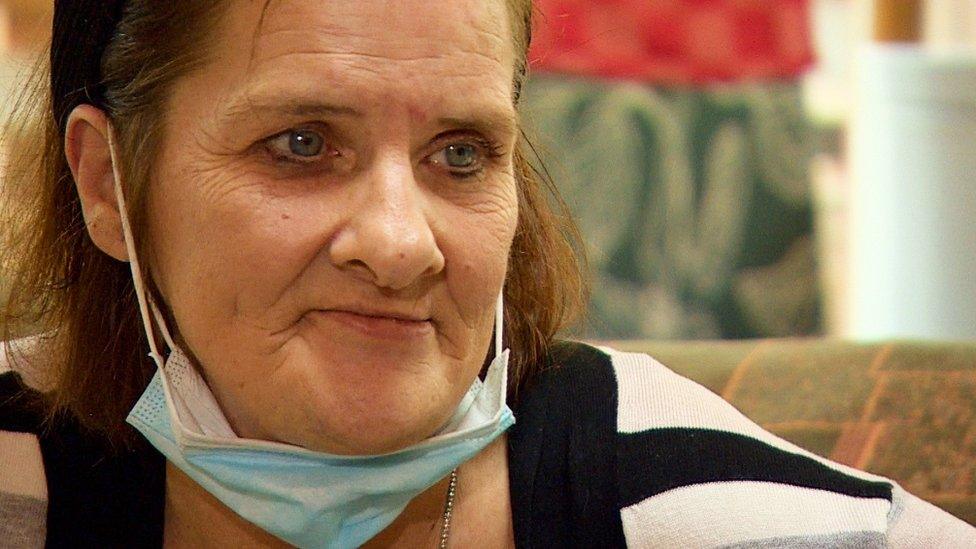
Sharon is considered a success story and is looking for a permanent place to live
There are limited women's refuges around the capital. Solace Women's Aid manages 22 refuges for women and children fleeing abuse. It offers 178 rooms across seven London boroughs.
Sharon has been staying in one of these rooms whilst receiving wraparound support for more than a year.
While living and begging on the streets for six years, she said she was constantly asked for sex: "Even sitting outside Sainsbury's, you would be surprised how many guys who ask you for business.
"But once you've done that so long you lose yourself."
Another outreach charity, Spires, helps about a dozen women every night. Women's service coordinator Stella, who has been supporting street workers for more than two years, said more women were becoming homeless because of rising rents.
She and her team hand out bags containing snacks and sexual health products. They also take the details of the women they meet in the hope of helping them further with essentials including accommodation or access to health professionals.
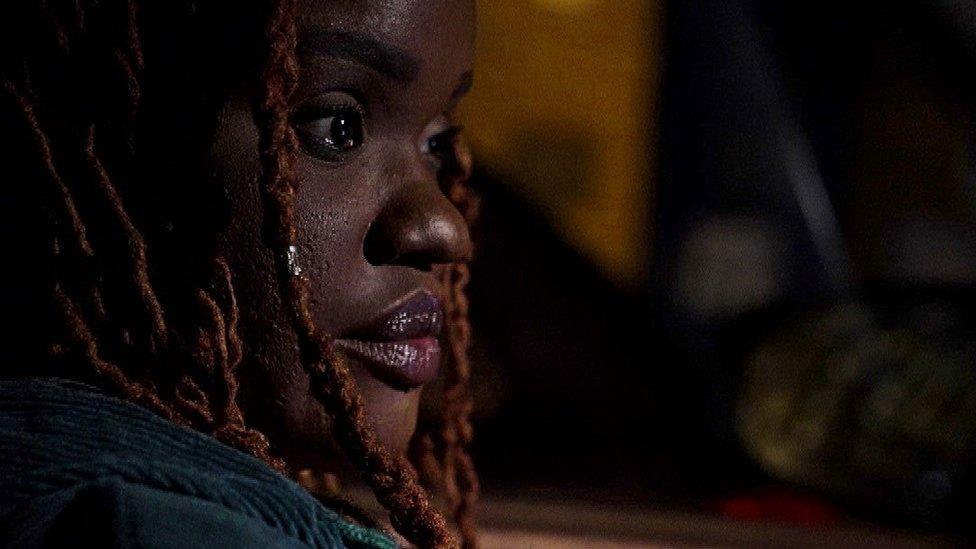
Stella says red light areas are often in quiet residential streets
The outreach workers focus on red light districts where sex workers, drug dealers and pimps work in very close proximity. Stella said: "Many of these areas are quiet residential side streets where men pick up women. They go here because it's away from the public and police."
Sharon is now looking for a more permanent home and wants to reconnect with her son: "The main thing now is being a mum. I failed miserably for a while but this time round I'm going to be better."
Sharon is a success story.
For there to be more success stories, more female-only accommodation needs to be made available. Women often don't feel safe in mixed-sex settings - as some hostels are - and often they are not safe.
More help is needed to support the women, both in terms of protecting themselves and in ensuring they can feed their families and pay the bills.
There are no easy solutions, no panacea.
And every night across the capital, as the darkness descends, the bright lights of cruising cars pick out the women waiting on corners.
London is still a place of buying, selling and stealing sex, of getting in cars to pleasure strangers for cash, of risking life and limb for a moment of transactional intimacy. Just to pay the rent.